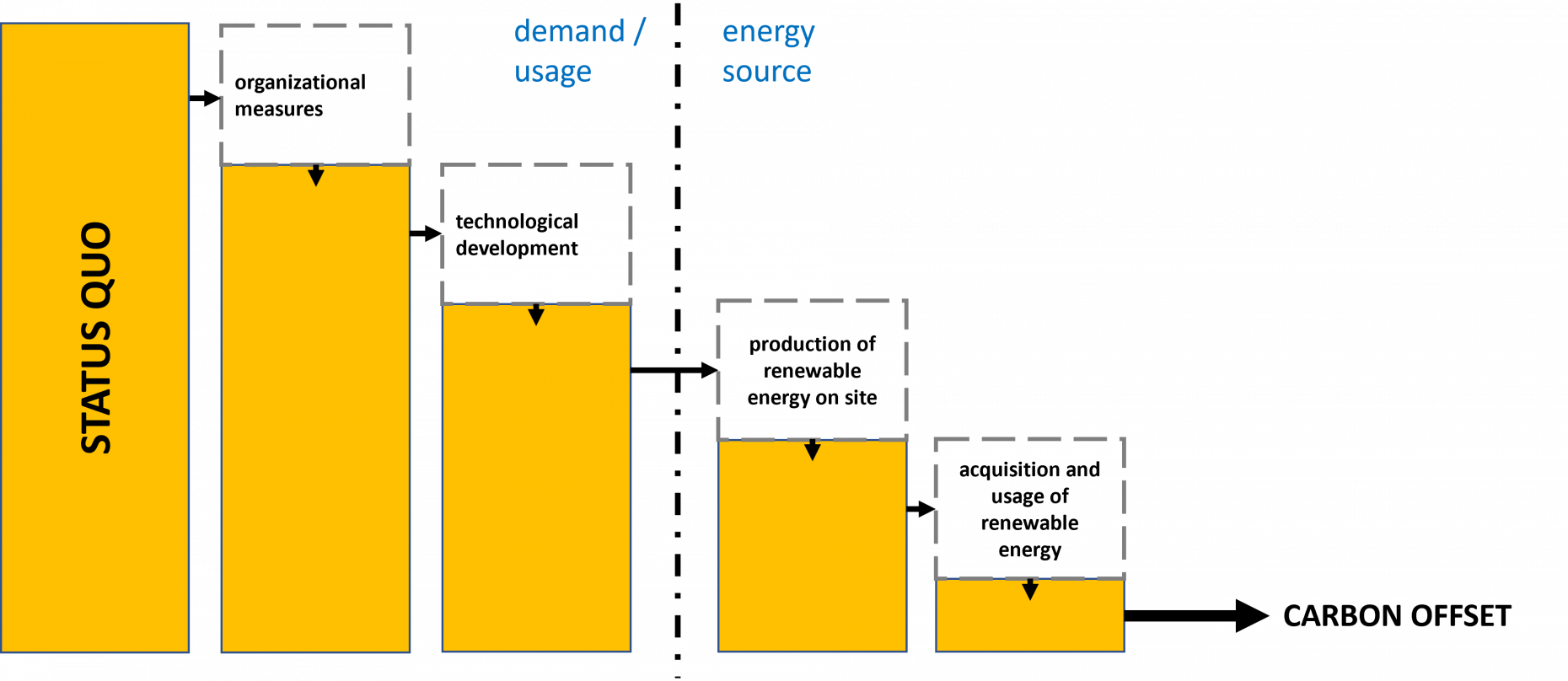CO2-Demobau - Exploration of the feasibility of carbon-neutral model construction sites
Short Description
Status
completed (July 2023)
Project Summary
Motivation and research question
The previous research project "CO2 neutral construction site" identified numerous measures to reduce CO2 emissions in the erection phase of buildings. In the exploratory project, the testing of measures on specific construction sites in Austria should be prepared in a large number. A wide range of organizational measures, technical developments, and the generation and purchase of renewable energy can be used to gain a significant amount of experience and knowledge from practical tests. The next logical step was to create the prerequisites to apply them collectively to different types of construction sites in the future and thus to handle the first CO2-neutral construction sites without compensation by 2030.
Initial situation/status quo
Due to the approaching climate disaster, which became evident at the latest by the accumulation of extreme weather events in the entire northern hemisphere at the end of the project (July 2023), there is no longer any justification for missing the climate targets. The building sector has improved greatly in recent years and decades compared to the agricultural and transport sectors. However, in the specific case, construction processes must improve continuously, not least due to the European "Green Deal" established in 2019, so that they remain taxonomy-capable – and thus financeable – and do not come to a standstill as a "stranded asset."
Content and Goals
The research project aims to identify concrete demonstration projects and develop individually tailored measures for carbon-reduced construction sites. From today's perspective, a completely carbon-neutral construction site without any compensation measures is still costly and, in most cases, not even possible. On the other hand, minor savings and compensation can be achieved quickly and easily. For this reason, the specific target for the demonstration building sites has been defined as follows: 20 % real savings on the demo sites before compensation measures. The sum of measures, which are tested in practice and are thus prepared for a broad application, should create the requirements for a carbon neutral construction site (without compensation) as a standard by the year 2040.
Methodology
Basic information has been gathered through extensive online research and interviews. An online survey on climate protection in the construction industry was carried out to gauge the industry's mood. The observation of a pilot construction site with selected measures helped gain a better understanding and assessment of the risks involved. The actual probing was mainly conducted through an online workshop with providers of innovative technologies for CO2 reduction and potential building owners.
Results and Conclusions
The majority of employees in the building and construction industry are in favor of the climate-friendly behavior of the construction industry. Switching to sustainable construction is costly, and public funding should be increased. Climate-friendly technologies, especially alternative propulsion, are already available, however, the market is not saturated (yet). There is no replacement for large construction equipment in the foreseeable future, but there could be a niche for e-fuels or bio-fuels. Massive expansion of hydrogen infrastructure could make H2 the future for powering trucks, provided that enough green hydrogen is available. The anchoring of climate protection in construction is well chosen in the Austrian Federal Procurement Act Of 2018 (referred to as "Bundesvergabegesetz 2018").
The Bundesvergabegesetz 2018 offers opportunities to consider ecological aspects in public tenders or during public procurement procedures, e.g., by formulating conditions in the contract and corresponding award criteria. Penalty clauses should be included in the construction contract. These apply if the contractor fails to meet the performance commitments, such as compliance with promised environmental measures.
During the research project, a residential building site in Feistritz (Carinthia) was chosen as a demonstration site. The proposed site consists of two residential buildings, each with 18 apartments on three upper floors and a basement. The gross floor area per building is about 1,150 m². The estimated start of construction will be in the fall of 2023, and the construction period is two years. Measures selected to reduce emissions include using energy-efficient containers with photovoltaics, batteries, charging stations, e-trucks, optimizing site transportation, and using certified green electricity for the rest of the required energy.
As was already assumed in the previous project, the preliminary risk assessment showed that a sufficient connected load is a prerequisite for the success of a construction site with electrically operated equipment. Moreover, when using electrical construction equipment, it must be checked beforehand whether the (permanent) power of the electrical equipment is sufficient for the project. The monitoring concept should be adapted to the actual conditions before construction starts for an efficient process. The exact measurement procedure and the calculation method for emissions and savings are contractually defined before construction begins.
Outlook
The next step in achieving the Austrian government's climate goals will be to tender and test the demonstration sites. The results can be used to optimize these sites, to identify performance losses, and, if necessary, to make up for these losses through an optimization process.
In addition, life cycle assessment of construction projects should be studied more closely to identify environmental impacts early using standardized evaluation systems. This way, consistent, transparent, and nationally coordinated sustainability assessments can serve as a basis for project decisions and a key element in achieving environmental and sustainability targets.
Project Partners
Project management
Vienna University of Technology - Institute for Interdisciplinary Construction Process Management
Project or cooperation partners
Ressourcen Management Agency (RMA)
Contact Address
TU Vienna
Maximilian Weigert
Karlsplatz 13/234-1
A-1040 Vienna
Tel.: +43 (1) 58801-23425
E-mail: maximilian.weigert@tuwien.ac.at
Web: https://www.ibb.tuwien.ac.at
Ressourcen Management Agency (RMA)
Hans Daxbeck
Kölblgasse 17/30
A-1030 Vienna
Tel.: +43 (1) 913 22 52-0
E-mail: hans.daxbeck@rma.at
Web: http://www.rma.at/

